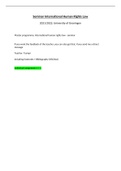Overig
Seminar Assigments International Human Rights Law
- Vak
- Seminar
- Instelling
- Rijksuniversiteit Groningen (RuG)
Seminar Assigments International Human Rights Law University of Groningen Master International Human Rights Law Individual assigments 1 + 2 Teacher: Tsampi Referencing: OSCOLA
[Meer zien]




